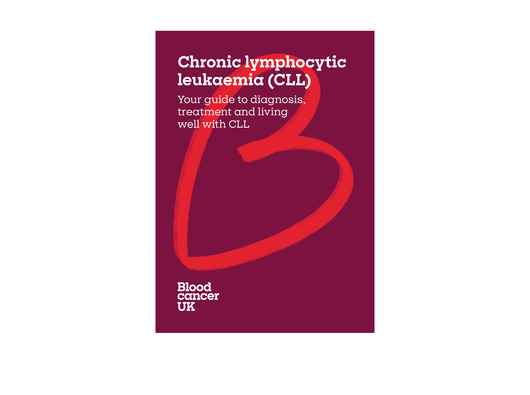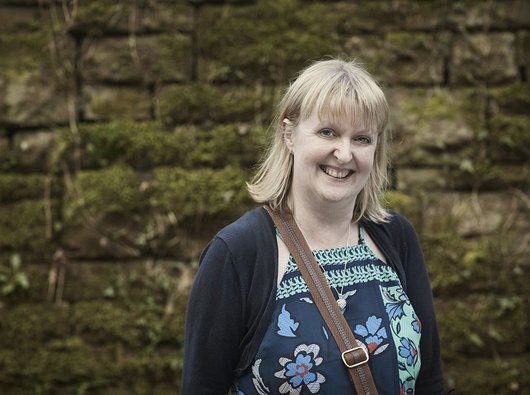Treatment options for CLL
If your hospital team thinks it’s time to start treatment for your CLL, they’ll explain the options open to you and what the risks are. It’s important you understand the options because you’ll be closely involved in any decisions about your treatment.
Types of treatment
If the time comes when you need treatment for CLL, your hospital team will recommend one or a combination of the following drugs.
These drugs are part of a group of medications called targeted therapies. Targeted therapies have recently replaced chemotherapy and chemo-immunotherapy as standard treatment for CLL, except in rare circumstances where they may not be available or suitable.
Inhibitors (cancer growth blockers)
Inhibitors are targeted drugs which block the signals that make cancer cells grow. Inhibitors used to treat CLL include acalabrutinib, ibrutinib, venetoclax and zanubrutinib. Inhibitors are usually taken as tablets over a period of months, or for as long as they continue to control the CLL and any side effects are manageable.
Monoclonal antibodies (immunotherapy)
Monoclonal antibodies are targeted drugs which can bind to and kill specific cells. Monoclonal antibodies for CLL include rituximab and obinutuzumab. They are usually given as a drip (an infusion) in hospital.
How will my doctor decide on my treatment?
There are several things your doctor will consider when deciding which treatments to recommend:
- Genetic test results – Testing for changes in the genes of your CLL cells will help your doctor recommend the best treatment for you.
- Your response to previous treatment – If you’ve had treatment for CLL before, your doctor will look at how well that treatment worked and whether you had significant side effects.
- Personal preferences – Your doctor will also take your personal circumstances and wishes into account. You’ll have the opportunity to share your preferences, ask questions and be part of the decision-making process. You might want to tell your hospital team what’s important to you, for example wanting to have treatment as an outpatient if possible rather than staying in hospital, so you can spend more time with your family.
- Short term vs long term treatment – You may hear this referred to as fixed duration vs continuous treatment. It means that some treatments are designed to be given over a set period of time and then stopped, whereas others can be taken every day for as long as needed. You can read more about the different types of treatment below.
If the CLL comes back (relapses) after treatment, you may be offered the same treatment again, if you responded well to it the first time round. Or, you may be recommended to try a different drug or combination of drugs, if your doctor thinks it may be more effective.
How long will I have treatment for?
Some targeted treatments are given for a fixed duration – this means you will take them for a set period of time, usually 12 to 24 months. This approach is commonly used for venetoclax-based combinations. There may be the opportunity within a fixed duration treatment plan to have a break from treatment for a short period of time, which may help you plan for and manage personal life events.
Other treatments, like BTK inhibitors (such as acalabrutinib, ibrutinib or zanubrutinib), may be taken continuously, sometimes for years, as long as the treatment is working and any side effects are manageable.
Your hospital team will explain which option they believe is most suitable for you, based on the genetic features of CLL and how you respond to treatment. You should also have the opportunity to share your own preferences and make a decision about which treatment to try together.
Your guide to CLL
This free booklet covers:
- treatment options
- what to expect from treatment
- side effects
- questions to ask your healthcare team
You can order it for free from our online shop.

Drugs and drug combinations
The main drugs and drug combinations for CLL are listed below in alphabetical order. See above for the things your doctor will consider when recommending a particular treatment.
Whatever treatment you have, our online community forum can bring you support from people who really understand what it’s like to go through it. Have a look at what other people are saying, or start your own thread.
Most people will be offered targeted treatment with inhibitors or monoclonal antibodies, or a combination of the two. Not all treatments are currently funded by the NHS and may not be approved in all four countries of the UK. Speak to your hospital team about which treatments are available for you.
Acalabrutinib is an inhibitor. It is taken as tablets.
Acalabrutinib can be used as a first treatment when the CLL shows a particular genetic mutation (genetic change) or when other treatments aren't suitable.
It can also be offered to people who have already had treatment, but the CLL has come back (relapsed or refractory CLL).
Acalabrutinib may be combined with the monoclonal antibody obinutuzumab. Obinutuzumab is given as an infusion (drip). This treatment is for people who haven’t had any previous treatment for CLL. It is not currently available on the NHS.
Ibrutinib is an inhibitor and is taken as tablets. On the NHS, ibrutinib can be used as a first treatment when the CLL shows a particular genetic mutation (genetic change) and other treatments aren't suitable.
It can also be used when the CLL has been treated previously but has come back (relapsed or refractory CLL).
Idelalisib is an inhibitor. Rituximab is a monoclonal antibody. Idelalisib is taken as tablets. Rituximab is given as a drip (infusion).
Idelalisib is known to increase the risk of getting serious infections, so people on this treatment will also be given antibiotics.
This combination is prescribed less often now than it used to be, but it may still be offered in certain situations if other treatments are not suitable.
Venetoclax is an inhibitor and is taken as a tablet. It can be offered to people who have not had treatment before, and those who have already had treatment if the CLL has come back (relapsed or refractory CLL). It is often given with other CLL treatments as explained below.
Some people may be prescribed venetoclax on its own, this is called venetoclax monotherapy. Usually, only patients who have previously had treatment and those with 17p abnormalities will have venetoclax monotherapy.
Venetoclax and ibrutinib are both inhibitors and are taken as tablets. This combination is for people who haven’t had any previous treatment for CLL.
Venetoclax is an inhibitor and obinutuzumab is a monoclonal antibody. Venetoclax is taken as tablets, and obinutuzumab is given as a drip (infusion).
This combination of drugs is given to people who haven’t had any previous treatment for CLL.
Venetoclax is an inhibitor and rituximab is a monoclonal antibody. Venetoclax is a tablet, and rituximab is given as a drip (infusion).
This combination can be offered to people who have already had treatment, but the CLL has come back (relapsed or refractory CLL).
Zanubrutinib is an inhibitor and is taken as a tablet.
It is an option as a first treatment when the CLL shows a particular genetic mutation (genetic change) or when other treatments aren't suitable.
It can also be offered to people who have already had treatment, but the CLL has come back (relapsed or refractory CLL).
Treatment in special circumstances
Pirtobrutinib is a newer type of BTK inhibitor which may be an option if the CLL has come back after treatment with ibrutinib, acalabrutinib, or zanubrutinib.
It is not yet routinely available on the NHS, but may be offered as part of a clinical trial or through individual funding requests.
Historical treatments
Chemo-immunotherapy treatments such as bendamustine and rituximab, chlorambucil and obinutuzumab, and FCR used to be prescribed frequently, but are now rarely recommended. This is because targeted therapies are generally more effective and cause fewer side effects.
However, these chemo-immunotherapy combinations may still be used if other treatment options are not suitable or available. If you are recommended chemotherapy, your doctor will explain why and may offer additional treatment to help you manage any side effects.
Questions to ask
The best place to get more information about your treatment is from your hospital team. They will explain why they are recommending a certain treatment and answer any questions you have.
Here are some questions you may like to ask:
- What treatment will I have?
- What is the aim of my treatment?
- Is there a clinical trial I can join?
- How and where will I be given the treatment?
- How long will treatment last?
- What might the side effects be?
- How can I manage these side effects?
- How will treatment affect my daily life?
- What’s the best outcome I can hope for?
- Who do I contact if I don't feel well?
- Who do I contact out of hours?
If you are keen to do your own research on specific drugs, it’s important to find accurate information. Googling often isn’t the best way to do this.
EMC is a website which publishes the Patient Information Leaflets drug manufacturers have to include in their packaging. Search the drug name and then click on the tab that says “Patient Leaflet”.
Be aware that these leaflets list all the side effects that have been reported and can look daunting. But remember that you won’t have all of these side effects and may not have any.
Always speak to your hospital team if you are worried or have any questions about your treatment.
"It's really important to ask questions and build up a rapport with your doctor, as they’re in the best position to allay any fears or concerns."
Kate, living with small lymphocytic leukaemia (SLL) since 2010
Contact our Support Service for advice on talking to your hospital team

Stem cell transplant
A stem cell transplant aims to give patients healthy stem cells, which can then produce normal blood cells. Generally, this is not a suitable treatment for CLL. That’s because the risks of a transplant aren’t justified when you have a slowly developing disease like CLL. A transplant also involves intensive chemotherapy, which is hard to tolerate for people who are older or have other health concerns.
For a few younger, fitter people with faster growing CLL, a transplant may be a reasonable treatment option that could lead to a cure. But the risks of a transplant need to be carefully considered, especially when there are safer treatments available.
People with CLL who need a stem cell transplant will be offered one that uses stem cells from a healthy donor (an allogeneic transplant).
The emotional impact of treatment
It’s normal to feel worried about starting treatment for blood cancer. It may feel like stepping into the unknown, but your hospital team is there to answer all your questions. Be sure to ask about anything that’s on your mind – it’s their job to explain what’s happening.
It can help to share your worries with other people who understand how you’re feeling. You can see what other people are saying about treatment and living with blood cancer on our online community forum.
If you need support talk to your hospital team about treatment or anything else, contact our Support Service on 0808 2080 888 or [email protected]. We can’t give you medical advice, but we can support you to make sure your questions are answered, and your wishes heard.

Talk to other people affected by blood cancer
Hear from and connect with people who understand.
